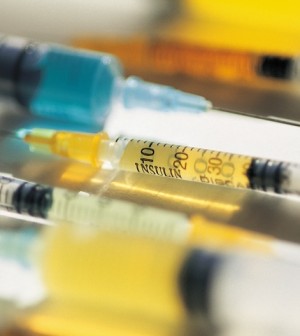- Are You Making This Expensive Thermostat Error This Winter?
- Recognizing the Signs of Hypothyroidism
- 10 Strategies to Overcome Insomnia
- Could Artificial Sweeteners Be Aging the Brain Faster?
- Techniques for Soothing Your Nervous System
- Does the Water in Your House Smell Funny? Here’s Why
- Can a Daily Dose of Apple Cider Vinegar Actually Aid Weight Loss?
- 6 Health Beverages That Can Actually Spike Your Blood Sugar
- Treatment Options for Social Anxiety Disorder
- Understanding the Connection Between Anxiety and Depression
Health Highlights: Feb. 17, 2014


Here are some of the latest health and medical news developments, compiled by the editors of HealthDay:
Number of Fertility Treatment Babies in U.S. Increasing
A record number of babies born in the United States in 2012 were conceived using fertility treatment, according to a new study.
In vitro fertilization (IVF) led to the birth 61,740 babies that year, which was 1.5 percent of all births in the nation. There were 2,000 more IVF-associated births in 2012 than in 2011, the Associated Press reported.
The Society for Assisted Reproductive Technology study also said that a growing number of women are using one embryo at a time in order to prevent multiple births, which can increase the risk of premature birth and other problems.
Four percent of women younger than 35 used single embryos in 2007, compared with 15 percent in 2012, the AP reported.
—–
Scientists Grow Human Lungs in Lab
U.S. researchers who were the first to successfully grow human lungs in the lab say their breakthrough could eventually save the lives of people waiting for a lung transplant.
The team at the University of Texas Medical Branch in Galveston started with a damaged lung, ABC News reported.
“We removed all the cells, all the material in it, and just left the skeleton of the lung, or the scaffold, behind — the pieces of the lungs that are not cells,” team leader Dr. Joan Nichols explained. “And then we added back cells from another lung that couldn’t be used for transplant but still had some viable cells in it.”
The scientists grew their first human lungs in the lab last year and said they hope to transplant the first set of lab-grown lungs into animals this year or next, ABC News reported.
But it could be five to 10 years, or even longer, before it might be possible to use lab-grown lungs to save the lives of people who need new lungs, the scientists said.
Currently, more than 1,600 people in the United States are waiting for a lung transplant, ABC News reported.
Copyright © 2026 HealthDay. All rights reserved.










